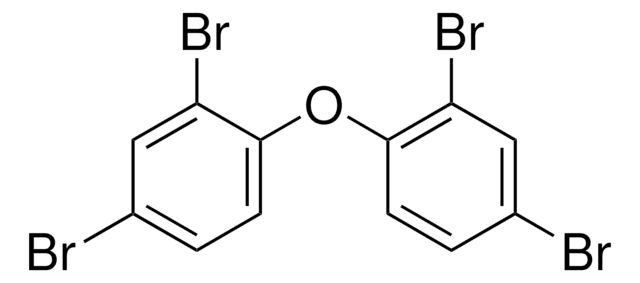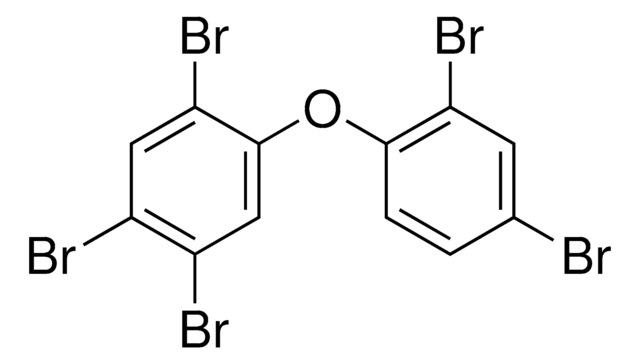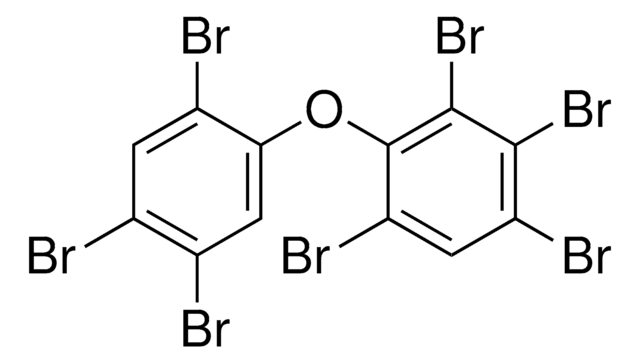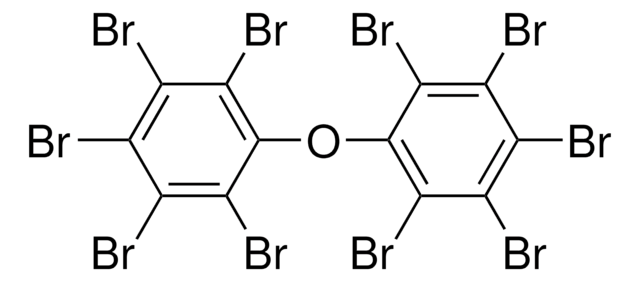Fontos dokumentumok
33681
BDE No 100 solution
50 μg/mL in isooctane, analytical standard
Szinonimák:
2,2′,4,4′,6-Pentabromodiphenyl ether solution, 2,2′,4,4′,6-PentaBDE, PBDE 100
About This Item
Javasolt termékek
grade
analytical standard
Minőségi szint
eltarthatósági idő
limited shelf life, expiry date on the label
koncentráció
50 μg/mL in isooctane
technika/technikák
HPLC: suitable
gas chromatography (GC): suitable
alkalmazás(ok)
environmental
format
single component solution
tárolási hőmérséklet
2-8°C
SMILES string
Brc1ccc(Oc2c(Br)cc(Br)cc2Br)c(Br)c1
InChI
1S/C12H5Br5O/c13-6-1-2-11(8(15)3-6)18-12-9(16)4-7(14)5-10(12)17/h1-5H
Nemzetközi kémiai azonosító kulcs
NSKIRYMHNFTRLR-UHFFFAOYSA-N
Általános leírás
Alkalmazás
- House dust samples using isotope dilution method combined with liquid chromatography coupled to negative ionization atmospheric pressure photoionization tandem mass spectrometry (LC-NI-APPI-MS/MS).
- Adipose tissue samples using gas chromatography coupled to ion-trap mass spectrometry (GC-IT-MS/MS).
Egyéb megjegyzések
The standard should be transferred to a clean and appropriate vial or flask using clean pipettes or micro pipettes. The vial should be immediately capped to avoid any loss or evaporation of the solvent.
After opening the ampoule, the standard should not be stored or kept in the ampoule. To preserve the integrity of the product, the standard should be transferred to an appropriate vial that must be capped and stored according to the recommendation on the Certificate of Analysis.
Figyelmeztetés
Danger
Figyelmeztető mondatok
Óvintézkedésre vonatkozó mondatok
Veszélyességi osztályok
Aquatic Acute 1 - Aquatic Chronic 1 - Asp. Tox. 1 - Flam. Liq. 2 - Skin Irrit. 2 - STOT SE 3
Célzott szervek
Central nervous system
Tárolási osztály kódja
3 - Flammable liquids
WGK
WGK 2
Lobbanási pont (F)
10.4 °F
Lobbanási pont (C)
-12 °C
Egyéni védőeszköz
Eyeshields, Faceshields, Gloves, type ABEK (EN14387) respirator filter
Válasszon a legfrissebb verziók közül:
Már rendelkezik ezzel a termékkel?
Az Ön által nemrégiben megvásárolt termékekre vonatkozó dokumentumokat a Dokumentumtárban találja.
Tudóscsoportunk valamennyi kutatási területen rendelkezik tapasztalattal, beleértve az élettudományt, az anyagtudományt, a kémiai szintézist, a kromatográfiát, az analitikát és még sok más területet.
Lépjen kapcsolatba a szaktanácsadással










